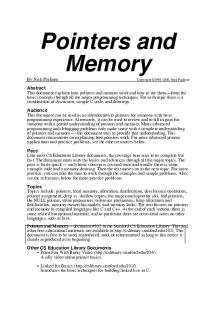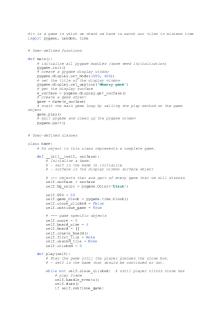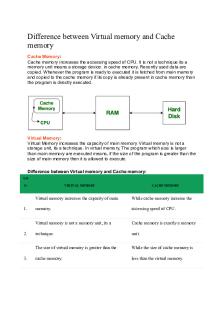Everyday Memory and Errors PDF

| Title | Everyday Memory and Errors |
|---|---|
| Course | Cognitive Psychology |
| Institution | Northwestern University |
| Pages | 4 |
| File Size | 75.5 KB |
| File Type | |
| Total Downloads | 16 |
| Total Views | 149 |
Summary
Professor David Rapp...
Description
DOWNLOAD SLIDES FROM THIS PPT Memory and ecological validity ● Word lists -- good for controlling (for category, frequency, grammar, etc.) but low validity ● What do we remember over the life span? ● How do we construct memories from real events? ● How do we distort memories? ○ Changes as a function of how likely they are to have happened ○ More likely to recall a false memory of being lost in a mall than getting surgery ● What are the implications for real-world circumstances? ○ Eyewitness testimony Autobiographical memory: episodic memories for specific events from our lives ● Conway (1996): 3 layers of knowledge, groupings may change with age ○ Event-specific (hours or minutes) ○ General event (weeks) ○ Lifetime (years) ● Some events are remembered better than others -- milestones, transitions ● Pillemer (1996): better recall in college alumni for start of freshman and end of senior years ○ Remembered critical parts of college Reminiscence bump: Schrauf and Rubin (1998), we have better memories for facts of adolescence and young adulthood -- late teens to early 20’s ● Life narrative hypothesis: personal identity is determined in these years ● Cognitive hypothesis: encoding is stronger in periods of rapid change (vs. stability) ○ To demonstrate this, find people who experienced changes at different points in their lives -- cultural phenomenon? ○ Bump is highest for when people immigrated to the US -- build specific memories when there is lots of change in your life ○ Shift and reduction in bump for people who immigrated to the US in their 30s
● Not fixed -- indicator of when change/transition has happened to a person How to Study Human Memories ● Brain damage patients ● Life narratives ● Longitudinal studies -- problems with attrition Bahrick (1975): studied accuracy of autobiographical memory for high school classmates’ names and faces ● 17-64 year-old participants (up to 47 year memory) ● Recall: picture cuing, free recall ● Recognition: name and picture recognition; name and picture mapping ● People were good at recognition over time, poor at recall ● Info is stored in LTM, but we have trouble retrieving it without cues ● In the real world, how accurate does memory need to be? Core principle at memory: recognition is better than recall because retrieval is supported by cues Flashbulb memories: rich, detailed memories that are encoded when something emotionally salient happens ● Members of society as a group have them ● Do they involve a special memory mechanism? ● Brown and Kulick (1977): emotionally-charged events with high consequentiality are readily remembered ● Hamann (1999) ○ Had people think about these events in PET scans ○ Emotionally-charged images led to higher amygdala activation and better memory ● Cahill (1995): Patient B.P. had amygdala damage, no enhancement for emotional events ● Do we have flashbulb memories for personal emotional events of our lives? Flashbulb memories... not special? ● Neisser (2000): flashbulb memory reflects ordinary mechanisms
○ But... characterized by frequent narrative rehearsal, decay, inaccuracies, plausible distortions Memories are not veridical ● Leveling -- detail loss when you describe memories at different times in your life ● Assimilation -- change to fit preconceptions ● Sharpening -- embellishment Comparing flashbulb and everyday memories: Talarico and Rubin (2003) ● on September 12, asked about memories for September 11, and for an ordinary event from September 10 ● Gave 3 groups questionnaires 7, 42, and 224 days later ● Measured consistency in recall across time, accuracy beliefs, vividness ● No differences in consistency from regular memories... so flashbulb memories are just like regular memories ● Big difference in confidence about accuracy and vividness... reports in accuracy, vividness are much higher for flashbulb than everyday memory ● Our beliefs make flashbulb memories feel different -- historically-important, define us, tell us about the world, talked about often Reproductive memory ● Accurate, verbatim memory of events and info -- “photographic”, computer memory ● We all wish our memories were like this, but common experience shows otherwise Prior knowledge guides selection, interpretation, and integration. ● We reconstruct what probably happened, rather than retrieving exact memories. ● Schema: memory representation containing info about a type of event or object, informed by prior knowledge ● Script: schema that describes an ordered series of events ● Bartlett’s War of the Ghosts ○ Had people read a story, and asked them to recall it
○ People reconstructed the story (about an unfamiliar group) to fit their own culture (existing schemas) ○ Schemas can lead to distortion ● Bransford and Johnson’s laundry description (1972) ○ We have difficulty remembering info unless we can retrieve a schema ○ Good at remembering an ambiguous story if we have a schema to put it in Brewer and Treyens (1981): schema-based distortions ● Tested recall for office contents ● Poor recall for inconsistent objects -- errors of omission ● False recall for missing consistent objects -- errors of commision ○ False memory!...
Similar Free PDFs

Everyday Memory and Errors
- 4 Pages

Syntax errors & Semantic Errors
- 2 Pages

A Measurements and Errors ppt
- 9 Pages

Syntax Errors Vs Semantic Errors
- 2 Pages

Pointers And Memory
- 31 Pages

Notes - Memory and Cognition
- 146 Pages

Pointers And Memory
- 31 Pages

Semantics and Syntax Errors 1
- 1 Pages

Memory
- 3 Pages

Memory
- 5 Pages

Between Memory and History -2
- 9 Pages
Popular Institutions
- Tinajero National High School - Annex
- Politeknik Caltex Riau
- Yokohama City University
- SGT University
- University of Al-Qadisiyah
- Divine Word College of Vigan
- Techniek College Rotterdam
- Universidade de Santiago
- Universiti Teknologi MARA Cawangan Johor Kampus Pasir Gudang
- Poltekkes Kemenkes Yogyakarta
- Baguio City National High School
- Colegio san marcos
- preparatoria uno
- Centro de Bachillerato Tecnológico Industrial y de Servicios No. 107
- Dalian Maritime University
- Quang Trung Secondary School
- Colegio Tecnológico en Informática
- Corporación Regional de Educación Superior
- Grupo CEDVA
- Dar Al Uloom University
- Centro de Estudios Preuniversitarios de la Universidad Nacional de Ingeniería
- 上智大学
- Aakash International School, Nuna Majara
- San Felipe Neri Catholic School
- Kang Chiao International School - New Taipei City
- Misamis Occidental National High School
- Institución Educativa Escuela Normal Juan Ladrilleros
- Kolehiyo ng Pantukan
- Batanes State College
- Instituto Continental
- Sekolah Menengah Kejuruan Kesehatan Kaltara (Tarakan)
- Colegio de La Inmaculada Concepcion - Cebu




